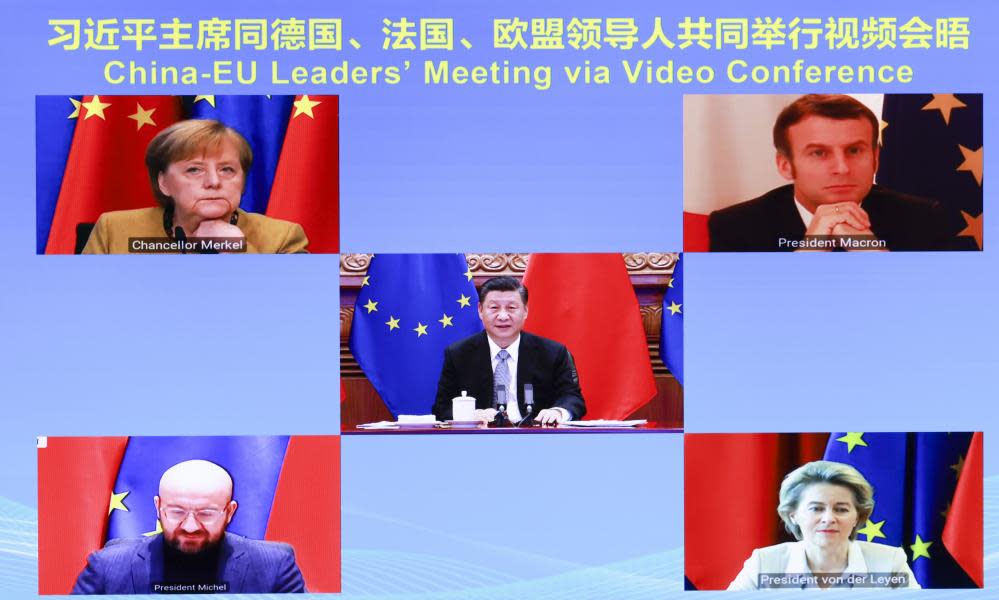China deal damages EU's human rights credibility, MEPs to say

Transatlantic tensions over how to handle China will come into the open next week when MEPs condemn the European commission for rushing to sign a controversial investment agreement with China that they say undermines the EU’s credibility on human rights.
The criticism, echoing views held inside the Biden administration in the US, will confirm the view of those including the UK that believe the determination of the German chancellor, Angela Merkel, to secure the China deal, and assert European autonomy from Washington on China, was a geopolitical blunder. The EU had set a deadline of the end of 2020 to reach the agreement.
The most complete analysis of the agreement yet published by the Institut Montaigne finds the agreement could not have been negotiated at a worse time, provides minimal additional market access and contains currently “next to no means” to enforce Chinese assurances over the eradication of forced labour.
The commission oversold the deal, largely due to pressure from Merkel, the report’s author, François Godement, told the Guardian.
The agreement, already a source of tension between the EU and the Biden administration, is due to be published in full on Friday, and the European parliament is set to pass a resolution next week condemning the way the agreement was rushed through and undermined the EU’s credibility on global human rights.
MEPs have a right to ratify the agreement and, according to Godement, this may take as long as a year. The delay will give the US time to seek changes to the agreement if it feels necessary.
Related: Mike Pompeo declares China's treatment of Uighurs 'genocide'
The new secretary of state, Antony Blinken, told the Senate on Tuesday that he believed China was committing genocide in Xinjiang province, remarks that indicate the Biden team are going to push a tough trade approach to Beijing.
A motion due to be passed by the European parliament next week will “regret the fact that the decision for a political conclusion of the comprehensive agreement on investment (CAI) has not reflected the European parliament’s requests in previous resolutions on Hong Kong for using investment negotiations as a leverage tool aiming at preserving Hong Kong’s high degree of autonomy, as well as its basic rights and freedoms”.
Godement argues the deal allows China “to build on Europe’s claims to have advanced its values while escaping enforcement and remedies on the issues that are at the heart of current public debates: environment and labour”.
He added: “Given China’s track record, it is impossible to rely on goodwill to implement commitments and unwise to believe that on key issues, a top-down political process between both parties can be substituted to legal arbitration.
“On WTO-plus issues, the deal fails to put a secure mechanism of implementation in place.”
No deadline is set for China to meet its International Labour Organization obligations.
He says that the EU is risking disaster for its interests and irrelevance for its values by going it alone and overestimating its potential for “strategic autonomy”.
British diplomats, meanwhile, see the EU-China investment deal as a potential opening for the UK to offer itself as a better ally to the US on China than the EU.
Related: UK free to make trade deals with genocidal regimes after Commons vote
But the British effort to portray itself as Biden’s true ally on China is weakened by the fact that, whatever the rhetoric of Boris Johnson’s government, UK investment in China is growing fast.
Foreign investment into China is up 6.2% to just under 1tn RMB (£110bn) in 2020, with the UK as one of the largest investors. British investment into China increased by 31% year-on-year, second only to the Netherlands in terms of investment growth.
The UK government is also resisting a human rights confrontation with China. It fended off an all-party effort to give the courts a chance to designate China guilty of genocide on the day that Blinken said China was intent on genocide in Xinjiang province.
The UK has not, unlike the US government, imposed any sanctions on Chinese officials for their role in suppressing democracy in Hong Kong, or for setting up “rehabilitation” camps for Uighur Muslims.

 Yahoo Movies
Yahoo Movies 
